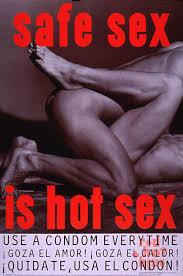For the past thirty years the term, "safe sex," has been a part of our vernacular. The term's popularity seems to have waxed and waned but it's always been there, relatively unchanged, while the world around it has changed drastically. In light of advancements in HIV treatment and prevention, such as PrEP and undetectable, does the term still have any meaning? And if not, what does that mean?
Safe sex was created at a time when our government literally treated AIDS like a joke and our Supreme Court held that gay sex was illegal. Scores of people were dying and fear gripped the nation. AIDS activists stepped in to provide our community with the latest information about preventing the disease. An urgent grassroots effort for community education gave us safe sex.
Safe sex was about how to keep you safe from HIV while having sex and it was mostly about using a condom all the time and every time. It became the catchphrase of HIV prevention and it consumed gay culture, giving us a myriad of sexy posters and such clichés as, "safe sex is hot sex." It was a prerequisite for any conversation about gay sex and it was an orthodoxy reinforced by advocates, public health, and social marketing campaigns.
The term safe sex became ubiquitous and nowhere was that more apparent then in online profiles. For over twenty years it was a way for men to indicate that they wanted to use a condom. Often the phrase was a visual representation of the adopting of a community norm, presenting the image of the good little gay boy, whether or not condoms were actually used.
Poz men had a particularly unique relationship to safe sex because we were no longer worried about getting HIV and many of us were having sex with other poz men. Often an unspoken principle of safe sex was avoiding sex with HIV positive people. Sex with poz guys seemed, to many, like the most dangerous thing a person could do. Now the science is overwhelmingly clear. Sex with an HIV-positive person with an undetectable viral load is one of least risky things one can do.
HIV prevention has fundamentally changed. It isn't just about condoms. In my work as director of health innovation at Hornet, I see how men are choosing all sorts of different ways to prevent HIV. But when I see a profile on an app that says someone is into "safe sex," I have no idea what they mean.
Do they mean condoms? Do they mean PrEP, undetectable, strategic positioning, or some combination? The term alone doesn't add much useful information about the sex they are looking to engage in. It seems to have become mere profile filler.
But if the terms safe sex has lost all meaning it shouldn't be a cause for alarm. It should be seen as an opportunity to shift the conversation away from safety and responsibility and instead talk about pleasure and desire.
What if risk was simply seen as incidental to our sex, as it has always been? Finding gay sex has meant risking violence, arrest, or exposure. What would it look like if our first question wasn't about safety but about pleasure? What if it was less about disclosing statuses and more about disclosing desires? What if it was simply about a meaningful connection between men?
Our community would look radically different if we invested as much in sexual exploration and empowerment as we did in risk mitigation. We are at a pivotal moment in our history where we might just be able to breathe life back into that long dormant sexual revolution from years past. Maybe gay men have finally reached a point when we can stop asking how safe sex is and start asking how good it is.

